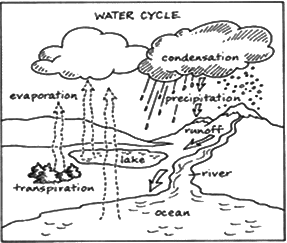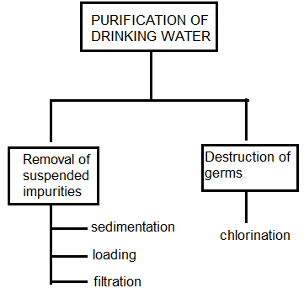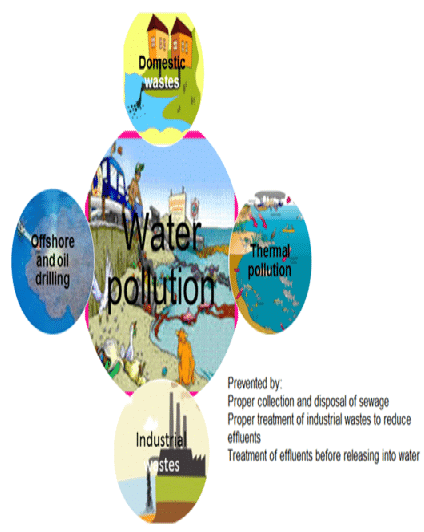Grade 6 Exam > Grade 6 Notes > Geography for Grade 6 > Revision Notes: Water
Revision Notes: Water | Geography for Grade 6 PDF Download

Water exists in three states solid ice, liquid water and gaseous vapour Sources of water on earth include
- Surface water: oceans, rivers, seas, lakes, ponds
- Underground water: wells, springs
- Above surface: rainwater
Water is a universal solvent and can dissolve many substances
The continuous circulation of water from earth to atmosphere and back is called water cycle

- Potable Water: Water suitable for drinking. Should be clean, transparent, odourless, free of impurities, germs and should contain some dissolved minerals and gases to give it taste

Water conserved by
- rainwater harvesting
- recycling waste water
- repair leaking taps
- avoid wasting water
- Rainwater harvesting
- Building dams
The document Revision Notes: Water | Geography for Grade 6 is a part of the Grade 6 Course Geography for Grade 6.
All you need of Grade 6 at this link: Grade 6
|
38 docs|4 tests
|
FAQs on Revision Notes: Water - Geography for Grade 6
| 1. What are the different states of water? |  |
Ans. Water exists in three main states: solid (ice), liquid (water), and gas (water vapor). In its solid state, water is less dense than its liquid form, which is why ice floats on water. When water is heated, it can evaporate into water vapor, which is an invisible gas.
| 2. Why is water important for living organisms? |  |
Ans. Water is essential for all living organisms as it plays a crucial role in various biological processes. It helps in digestion, nutrient transport, temperature regulation, and waste removal. Additionally, water is necessary for photosynthesis in plants, which produces oxygen and food for the ecosystem.
| 3. What are some sources of water? |  |
Ans. Water can be sourced from various places, including rivers, lakes, ponds, and underground aquifers. Rainwater is another important source, as it replenishes surface water bodies and groundwater. Additionally, glaciers and ice caps also store significant amounts of freshwater.
| 4. How can we conserve water? |  |
Ans. Water conservation can be achieved through various methods, such as fixing leaks, using water-efficient appliances, and practicing mindful water usage like turning off taps while brushing teeth. Collecting rainwater and using it for gardening or other non-potable purposes is another effective way to save water.
| 5. What is the water cycle? |  |
Ans. The water cycle is the continuous process through which water moves through the environment. It involves evaporation (water turning into vapor), condensation (vapor forming clouds), and precipitation (rain or snow falling to the ground). This cycle is vital for replenishing water sources and maintaining ecosystems.
Related Searches
















